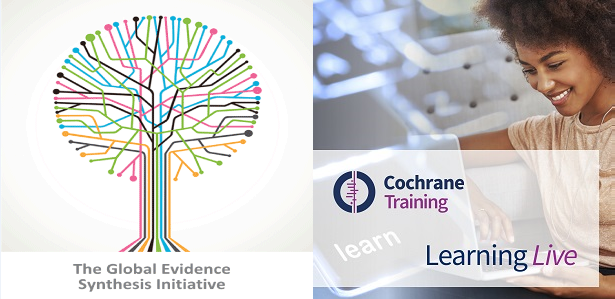 This webinar is the fifth in a series that Cochrane Learning Live is running in partnership with GESI: the Global Evidence Synthesis Initiative.
This webinar is the fifth in a series that Cochrane Learning Live is running in partnership with GESI: the Global Evidence Synthesis Initiative.
Rapid reviews are a type of knowledge synthesis for which the steps of a systematic review are streamlined or accelerated to produce evidence in a shortened timeframe. In this webinar, Dr Andrea C. Tricco and Dr Etienne V. Langlois will outline the usefulness of rapid reviews for providing actionable and relevant evidence to make informed decisions, describe how to engage knowledge users (e.g. patients, healthcare providers, policy-makers) in the conduct of rapid reviews, and discuss different rapid review methods that can be used in various contexts. Prof John Lavis will describe similarities and differences across a range of EVIPNet-affiliated rapid evidence services and provide examples of how they’ve evolved over time in response to their experiences working with health-system policymakers and stakeholders.
This webinar is for anyone interested in how rapid reviews can be conducted and used to inform decision-making.
Presenters bios:
Dr Andrea C. Tricco (PhD, MSc) from the Li Ka Shing Knowledge Institute of St. Michael’s Hospital, Toronto, Canada, holds a Tier 2 Canada Research Chair in Knowledge Synthesis. Her research interests are related to responding to knowledge users (including patients, healthcare providers, and policy-makers) through knowledge synthesis. Her research also focuses on advancing the science of knowledge synthesis and she is leading research projects related to rapid reviews, network meta-analysis, and scoping reviews.
Dr Etienne V. Langlois from Alliance for Health Policy and Systems Research (HPSR), World Health Organization, Geneva, Switzerland, is an epidemiologist specialized in health systems research, maternal and neonatal health care services, and knowledge synthesis. Trained in medicine, global public health and epidemiology, he manages for the WHO Alliance HPSR various portfolios of work on primary health care systems, health systems research synthesis, implementation research and embedded research, placing evidence-to-policy at the centre of its activities. Dr Langlois’ research focuses on skilled birth attendance and postnatal care services in low- and middle-income countries (LMICs), as well as methods to advance embedded research and health systems research synthesis. His previous positions include researcher and lecturer in clinical epidemiology and global health at the Faculty of Medicine, University of Montreal, Canada. He lived in Burkina Faso and worked in numerous LMICs, an experience which led him to be a strong advocate of evidence-informed interventions to support health equity and universal health coverage.
Prof John Lavis holds the Canada Research Chair in Evidence-Informed Health Systems. He is the Director of the McMaster Health Forum (and Forum+), Co-Director of the World Health Organization (WHO) Collaborating Centre for Evidence-Informed Policy, Associate Director of the Michael G. DeGroote – Cochrane Canada Centre, and Professor in the Department of Health Evidence and Impact at McMaster University.
Sign up
Tuesday 31 October 13.00 UTC [check in your timezone] We are now fully booked. Recording to follow after the webinar.
